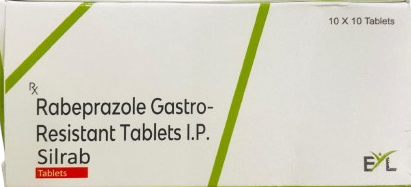
Rabeprazole
Rabeprazole Gastro-Resistant Tablet I.P.
Rabeprazole Gastro-Resistant Tablet I.P. is a medication used to treat various acid-related disorders of the stomach and esophagus. Here's a detailed overview of the drug, including its composition, mechanism, uses, dosage, side effects, precautions, and more:
General Information
Name: Rabeprazole Gastro-Resistant Tablet I.P.
Drug Class: Proton Pump Inhibitor (PPI)
Form: Gastro-resistant tablet (delayed-release)
1-Reduces Stomach Acid Production
Gastroesophageal reflux disease (GERD)
Peptic ulcers
Zollinger-Ellison syndrome
Acid reflux
Helicobacter pylori infection (in combination with antibiotics)
2-Promotes Healing of Ulcers
Creates a favorable environment in the stomach and intestines for healing. 3-Prevents Ulcer Recurrence
Particularly useful for long-term management of chronic conditions like GERD.
4-Usually Well-Tolerated
Fewer short-term side effects compared to other acid-suppressing drugs like H2 blockers
5-Convenient Dosing
Typically taken once daily, which improves compliance.
Common (but usually mild):
Headache
Nausea
Diarrhea or constipation
Abdominal pain or flatulence
Dizziness
Less Common but Serious (especially with long-term use):
Vitamin B12 Deficiency
Acid = ↓ B12 absorption over time
Magnesium Deficiency(Hypomagnesemia)
Can lead to muscle cramps, irregular heartbeat
Increased Risk of Fractures
Especially in elderly with long-term use (due to decreased calcium absorption)
Kidney Problems (e.g., interstitial nephritis)
Rare but possible; watch for unexplained fatigue or swelling
Increased Risk of Infections e.g., Clostridium difficile in the intestines, pneumonia
Lupus-like symptoms
Rare autoimmune response (rash, joint pain)
